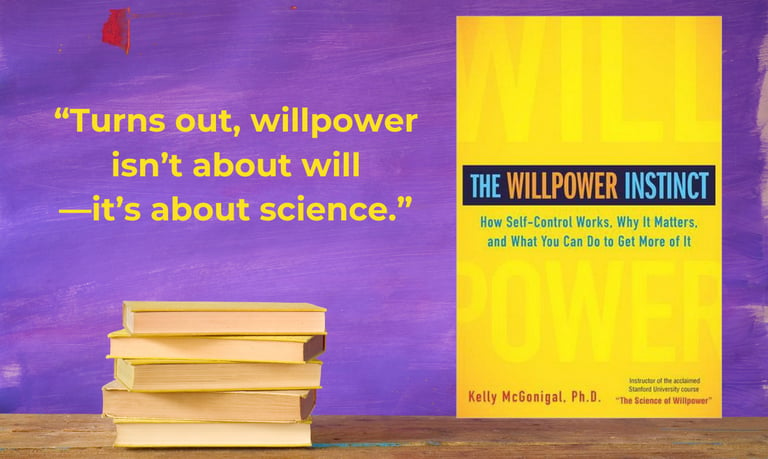The Willpower Instinct
BOOK REVIEWS


“Turns out, willpower isn’t about will—it’s about science.”
In The Willpower Instinct, Kelly McGonigal flips the script on everything we think we know about self-control. Instead of viewing willpower as a muscle we simply need to "strengthen," she reveals the fascinating science behind why we fail at resisting temptation, procrastinate, or break habits. It’s not just about being tough; it’s about understanding how your brain works and using that to your advantage.
Why This Book Matters for Anyone Trying to Get Their Life Together
Willpower feels like this elusive superpower we can never quite tap into when we need it most. Whether it’s saying no to that late-night snack, dragging ourselves to the gym, or staying focused on a work project, we’ve all had those moments where willpower seems to vanish into thin air. McGonigal’s book shows us that we’re not failing at willpower—our brains are just wired in certain ways that make it harder. And the best part? She teaches us how to hack our own brains to actually build willpower, one small step at a time.
Key Takeaways for Future Success
Willpower is a Biological Process: The book dives into how our brain chemistry—especially the prefrontal cortex—controls willpower. Understanding this helps us be more compassionate with ourselves (because it’s science, not just weakness).
Stress is the Enemy of Willpower: One of the biggest surprises? Stress wreaks havoc on self-control. When we’re stressed, our brain literally shuts down the parts responsible for willpower. So if you want to improve your willpower, managing stress is step one.
"I Will, I Won’t, I Want": Willpower is of three key types: "I will" power (taking action), "I won’t" power (resisting temptation), and "I want" power (remembering your long-term goals). Balancing these three is the secret sauce for making lasting changes.
Putting into Practice
I had one of those “ah-ha” moments where I realized why I’ve been struggling with procrastination and willpower. I’m still very much a work in progress, but this book gave me a new way of looking at my challenges. Instead of feeling frustrated when I give in to distractions or put things off, I’m starting to understand how stress and my brain’s wiring play into it. I’ve started trying small things, like reducing stress with short breathing exercises (baby steps!), and I’m more aware of when I’m letting immediate gratification pull me away from long-term goals. I haven’t mastered it yet, but at least now I don’t feel like I’m fighting a losing battle—I’m learning to work with my brain instead of against it.
Quote to Remember
“Willpower is not a virtue. It is a biological function that can be improved with practice.”
This quote stuck with me because it removes the guilt and shame we often feel when we struggle with self-control. Instead of seeing willpower as something we "should" have, it’s more helpful to see it as a skill we can train, just like anything else.
How It Helps You Look Forward
It’s a practical guide based on science, showing how small changes in habits and mindset can build real, lasting self-control. Whether you’re looking to break a bad habit, set better boundaries, or stick to your long-term goals, McGonigal gives you the tools to understand how your brain works and how to make it work for you. And the best part? It’s not about perfection—it’s about progress. So, if you’ve ever felt like willpower is your weak spot, this book will change the way you see it—and make getting your life together feel a whole lot more doable.
